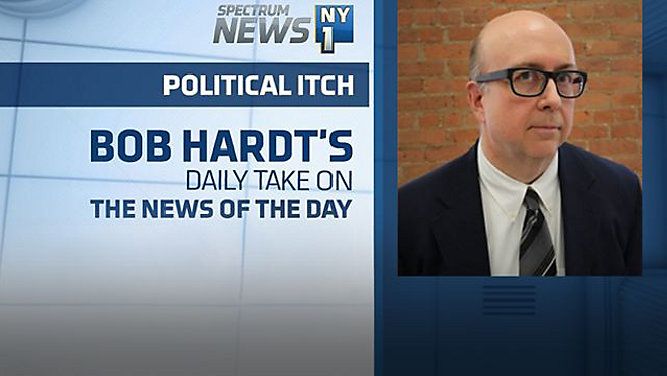In the avalanche of memories unleashed by the death of John McCain on Saturday, there stands a weird episode in New York politics when the maverick Arizonan threw his support behind then-Mayor Rudy Giuliani's fledgling campaign for the U.S. Senate against Hillary Clinton.
Less than a month after McCain dropped out of the 2000 presidential race, he returned to the campaign trail for the first time to travel with Giuliani in a bus modeled after the senator's "Straight Talk Express." There was more than a little irony in Giuliani's embrace of McCain's freewheeling presidential campaign bus on which he had entertained reporters for hours and nothing was really off the record. The dour Giuliani was hardly a happy warrior or a fan of reporters, barely acknowledging them on several fundraising road trips during his exploratory Senate run, which took him out of the state to California, Texas and even Arkansas.
Even though Giuliani fell into Republican lockstep and supported George W. Bush in the presidential primary campaign that year, it was clear at the time that his heart really was with McCain's free-spirited run. The often-grumpy mayor was in a rare good mood when McCain hit the road with him on Long Island, even inviting me along for a good chunk of the ride as the pool reporter for the New York Post, where I then worked.
Surprisingly, the thing that struck me during the banter between the two men was how much more emotional depth there was to Giuliani than McCain. When we started talking about pop culture, the mayor waxed poetic about HBO's "The Sopranos" and its nuanced portrayal of the mob. McCain said he preferred the movie "Analyze This" – far lighter mafia fare that lacked the grit of Tony's tortured relationship with his mother.
McCain was also far sunnier than Giuliani when talking about the political landscape, avoiding the mayor’s nasty talk about Hillary Clinton’s New York carpetbag.
Still, it felt like Giuliani might be going places while McCain’s "Straight Talk" would be forever mothballed.
Speaking to an audience of Giuliani supporters on that April day, McCain tried to liken the mayor to himself, telling them: "We need more mild-mannered, even-tempered individuals like Rudy and myself who will never rock the boat or say anything that’s controversial in nature."
Looking at Giuliani’s career since, “controversial” would be a decaffeinated way to describe it. From a washed-up lame duck mayor who morphed into "America’s Mayor" on 9/11 to running twice for President (including against McCain in 2008) to Donald TrumpPs yes-man, Giuliani has made some, um, head-scratching career decisions. McCain, on the other hand, rose to even higher prominence, working with Hillary Clinton for eight years in the Senate and avoiding the later calls to "lock her up."
While Giuliani became Donald Trump’s lawyer, McCain worried that Trump was actually breaking the law – even ignoring GOP omerta and openly talking about it.
About six weeks after his bus ride with McCain, Giuliani ended his Senate bid because his personal life was falling apart and he was diagnosed with cancer. Eighteen years later, Giuliani's physical health seems just fine and John McCain is dead.
Bob Hardt




